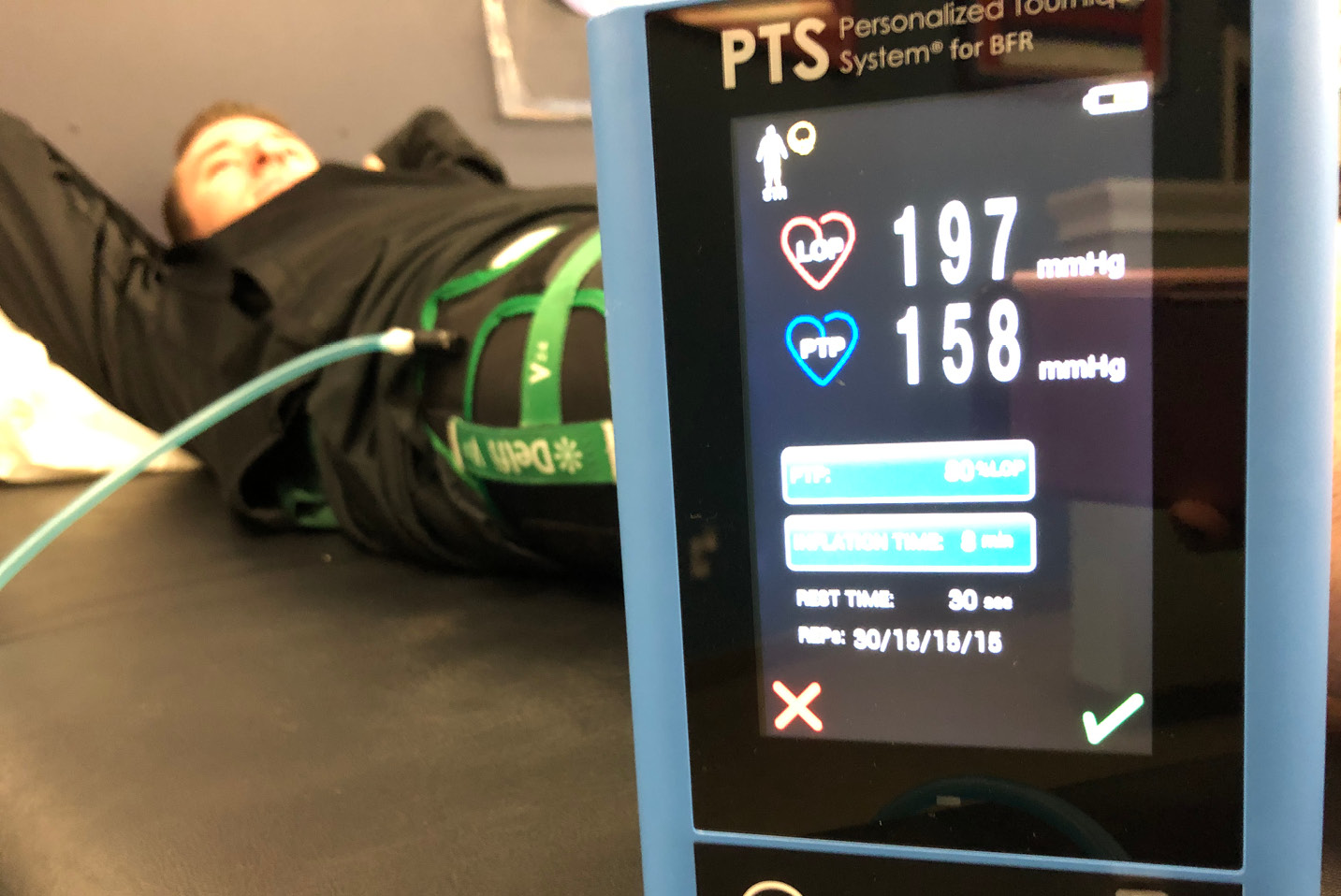
Blood flow restriction (BFR) is one of many modalities that can be used in physical therapy treatment. During BFR treatment, a trained physical therapist uses a specialized inflatable device to apply pressure to an extremity during exercise in order to reduce blood flow to that area and promote muscular strengthening. This therapy has been shown to reduce rehab time and improve outcomes in appropriate candidates.
So who’s a good candidate for BFR? Well, it’s been proven beneficial for a variety of patient populations, including:
- Post-Operative Patients. Because BFR doesn’t require patients to apply such an aggressive load to their exercise to increase muscular gains, it can be particularly useful for post-operative patients. BFR has been demonstrated to significantly improve patient outcomes following ACL surgery, both acutely and chronically. (If you’ve ever had ACL surgery, or seen anyone who has had this surgery, you’ll know how quickly that quad muscle wastes away. BFR can help!)
- Non-Operative Patients. BFR has also been shown to improve results for individuals who suffer from muscle wasting diseases, such as polymyositis and dermatomyositis. It can also be beneficial in women with risk factors for symptomatic osteoarthritis or patients experiencing patellofemoral pain.
- Elderly Patients. BFR may be beneficial to an elderly patient since it provides strength gains with reduced joint stress, but there are many additional factors when considering applying BFR to this population.
It’s important to note that there are some clear contraindications for BFR. If you have a history of blood clots or have a current blood clot, you would not be a candidate for this therapy. Similarly, patients with the following medical conditions may be at increased risk of an adverse reaction:
- Active cancer
- Poor circulatory system
- Obesity
- Diabetes
- Arterial calcification
- Sickle cell trait
- Hypertension
- Renal compromised
Anyone with an extremity infection, lymphadenectomy, acidosis, open fracture, intracranial pressure vascular grafts, or on medications known to increase clotting risk should also avoid BFR treatment. You should always check with a medical professional to ensure that any type of treatment or therapy is safe for you.
The EXCEL Difference
If you’re considering incorporating BFR into your rehab program it’s important to work with a trained clinician using professional-grade equipment. At EXCEL, we understand that not every patient is the same. In addition to reviewing your individual case and carefully considering the indications and contraindications, we also work closely with your prescribing physician to determine if BFR should be included in your plan of care.
To ensure our patients’ safety, we use an FDA-approved system that includes a Doppler controlled tourniquet. Our Personalized BFR (PBFR) equipment applies a customized amount of pressure to the limb based on race, gender, limb circumference, tissue density, blood pressure, cuff type, and cuff placement. As a result, we’re able to apply the minimal amount of pressure necessary to produce results—a safeguard that helps protect the other soft tissue structures, like nerves, that will be compressed under the pressure of the cuff.
Our physical therapists will put together a carefully curated exercise program just for you. Once the PBFR equipment is applied, our staff provides constant supervision as you move through your exercise program. Proper exercise technique is just as important as the equipment we use. Our state-of-the-art equipment and our therapists’ attention to detail are how we excel.
Wondering if BFR is right for you? Contact us now.
References
- Slysz, Joshua et al. “The efficacy of blood flow restricted exercise: A systematic review & meta-analysis.” Journal of Science and Medicine in Sport, Volume 19, Issue 8, 669 – 675, September 2015.
- Patterson, Stephen D et al. “Blood Flow Restriction Exercise: Considerations of Methodology, Application and Safety.” Frontiers if Physiology, Volume 10, 533, May 2019.
- “Personalized Blood Flow Restriction.” Owens Recovery Science – Blood Flow Restriction Training, www.owensrecoveryscience.com/.

Allison Tabrys, PT, DPT, CSCS
Clinic Director, Excel Physical Therapy – Montvale
15 S. Kinderkamack Road, Montvale, NJ 07545
The medical information contained herein is provided as an information resource only, and does not substitute professional medical advice or consultation with healthcare professionals. This information is not intended to be patient education, does not create any patient-provider relationship, and should not be used as a substitute for professional diagnosis, treatment or medical advice. Please consult with your healthcare provider before making any healthcare decisions or for guidance about a specific medical condition. If you think you have a medical emergency, call your doctor or 911 immediately. IvyRehab Network, Inc. disclaims any and all responsibility, and shall have no liability, for any damages, loss, injury or liability whatsoever suffered as a result of your reliance on the information contained herein.
